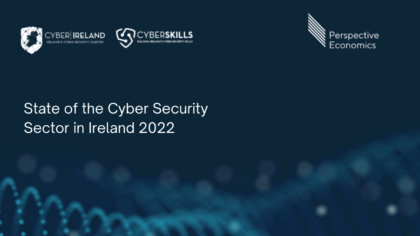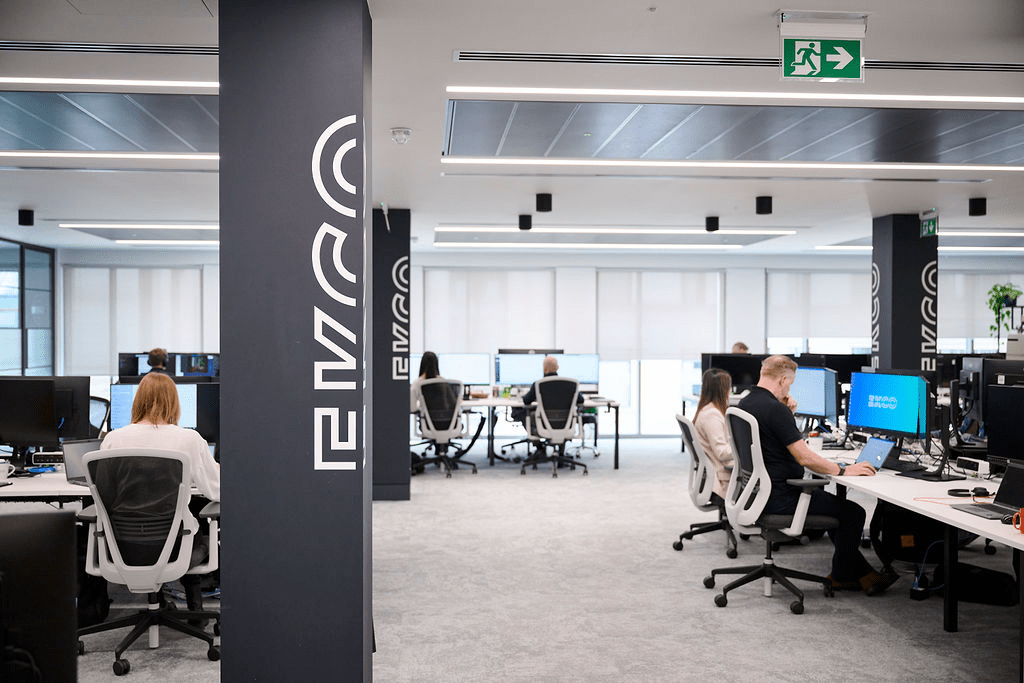Pat Larkin on cyber security’s bright future in Ireland
Ireland is 4th in the world when it comes to cyber security, thanks to Cyber Ireland’s inaugural state of the industry report, which has benchmarked cyber in Ireland for the very first time. We spoke to Ekco’s Pat Larkin, a Cyber Ireland board member, to learn more.
Cyber Ireland is a government-funded cluster that brings together industry, academia and government to develop the cyber security sector in Ireland. It aims to continue the success of Ireland IDA, which has had success attracting tech investment, particularly cyber tech, to Ireland since 2014.
We spoke to Ekco’s Pat Larkin, who is also a Cyber Ireland board member, to learn more about Cyber Ireland’s inaugural State of the Cyber Security Sector in Ireland report. It’s an exciting report as it’s the first that properly understands the size and scale of the Irish cyber security industry, along with the value it brings to the economy.
 Ekco’s Pat Larkin – a Cyber Ireland board member
Ekco’s Pat Larkin – a Cyber Ireland board member
“This isn’t your usual industry report. It doesn’t say ‘this is the cost of a cyber attack’ or ‘this is how much companies are paying in ransoms.’” Pat explains, “There’s plenty of that out there already. This is much more about how many people are employed and the gross value added. You know, what’s that as a percentage of GDP? How many companies are involved? All that sort of stuff.”
Pat was surprised at the sheer number of cyber security companies there are in Ireland, explaining that the data has already boosted Ireland’s image on the global stage: “nobody has baselined Ireland before in terms of actual economic value. Already, Ireland’s cyber ranking has jumped 10 or 15 places to 4th in the world.”
Key findings from the report
- 489 firms in Ireland offer cyber security products or services or have internal cyber security operations people.
- Approximately one third of cyber security firms are dedicated to cyber security services, whereas the others offer cyber security as part of a broader offering.
- Almost 50% of Irish cyber security firms are native to Ireland. There is a relatively even split between large firms and SMEs.
- The sector employs 7,351 people in Ireland. Teams are typically small, and nearly two-thirds of firms employ between one to nine cyber security professionals.
- Foreign direct investment supports c.71% of all employment in the sector. Cyber security firms headquartered in the United States have a strong presence in Ireland, making up 28% of firms and supporting 55% of all employment.

Pat was surprised at the sheer number of cyber security companies there are in Ireland, explaining that the data has already boosted Ireland’s image on the global stage: “nobody has baselined Ireland before in terms of actual economic value. Already, Ireland’s cyber ranking has jumped 10 or 15 places to 4th in the world.”
If that’s the starting point, there’s a bright future ahead. But what’s the difference between a podium contender and a world leader?
“If we want to capitalise on this opportunity, we have several areas to work on. You know, the talent pipeline, research centres – all of those sorts of things. We’ve proven that cyber is a significant player. Let’s look at the obstacles we need to overcome to achieve growth over the next five to ten years.”
It’s all about creating the best environment for companies to thrive, helping startups scale and creating a talent pool that attracts more companies from overseas.
What are the benefits of investing in cyber?
Get it right and it’s a self-fulfilling prophecy. Pat believes the sector could be as big as pharma, contributing over 10 billion euros to the economy. With more investment from the government and a steer from Cyber Ireland, he explains the vision for the cyber industry. A vibrant community of specialist companies; top talent coming from universities and abroad; R&D spotting market opportunities; companies practising good cyber security by default, strengthening Ireland’s image further.
On the other side of the coin, Pat explains that a lack of action will harm the economy.
“30% of European data is hosted in Ireland.” Pat explains, “From a national security perspective, if we can’t keep the lights on – the data centres running and the health system functioning – all that data will quickly pour out of Ireland. Digital companies are entirely transient, they aren’t tied to Ireland. They can just uproot operations and leave if they like. The same goes for skills – if we can’t defend ourselves, security professionals will leave and go to a country they think is better for their career, like Estonia or Israel.”
Pat’s been calling for a new approach to national defence for some time, which we covered a while back on the first anniversary of the HSE attack.
The cyber security skills gap
Anyone who has tried to hire cyber professionals knows how scarce talent is today. There’s a huge demand for skills as companies take security more seriously, and the report highlights this – the average salary for a cyber security professional in Ireland sits at €75,000.
Increasingly, organisations outsource cyber security as an alternative. These highly specialised, dynamic roles are difficult to fill and, from a cost perspective, even harder to justify if security isn’t your core business. If you do attract someone, it’s several months before they make a real difference, and then there’s always the risk they leave. The short-term solution is to outsource to specialist providers who have the skills in-house. In time, however, the skills gap is a challenge that Cyber Ireland is keen to address.
“The talent pipeline is probably top of the four problems we have to solve,” states Pat, “We’re thinking about a separate labour report that looks at the demand, the resource pool, and how we bridge that gap. This will probably give a three-year view. There’s no point going beyond that as the market reboots itself so quickly.”
The State of the Cyber Security Sector report shows the continued professionalisation and complexity of IT security. For IT managers, delivering effective security is no longer just a technical problem, and can no longer be solved effectively in-house. To see how we can help you bridge the skills gap and deliver an effective, end-to-end security solution, get in touch with our security specialists today.

Question?
Our specialists have the answer
